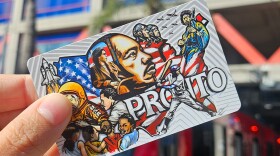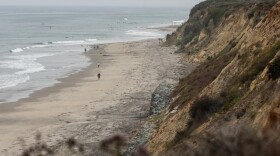LIANE HANSEN, host:
From NPR News, this is WEEKEND EDITION. I'm Liane Hansen.
Insurgents killed 19 Iraqi soldiers in a coordinated ambush yesterday northeast of Baghdad. Survivors of the attack said insurgents set off a roadside bomb and then fired rocket-propelled grenades and machine guns at the Iraqi army unit. The attack on the Iraqis came at the end of a week in which 14 American service members were also killed. The American dead included 10 Marines, who died in a single bomb blast just outside of Fallujah, the deadliest attack against Marines in four months. NPR's Anne Garrels is on the line from Baghdad.
Anne, there's been a great deal of anticipation that these insurgent attacks are going to increase before the national elections on December 15th. Is it your impression that the week marks a change in the pace of the attacks, or do you think that these are just two particularly deadly incidents?
ANNE GARRELS reporting:
There appear to be more attacks, and the attacks are more deadly. Even in November, when the US Command said suicide bombings fell to their lowest level in seven months, that didn't result in less bloodshed. Eighty-five US troops died last month, one of the highest tolls since the invasion, partly because roadside bombs are more powerful and more efficient. And assassination of key figures continues. Today a cleric, an aide to Moqtada al-Sadr was gunned down, as well as a senior official in the interior ministry. Political and criminal kidnappings of Iraqis continue on a regular basis. And after a lull, there's been a recent spate of kidnappings of foreigners by insurgent groups.
HANSEN: Explain how the upcoming elections on December 15th differ from the national elections that were held last January?
GARRELS: Well, there's a crucial difference. Instead of yet another interim government, these elections will usher in a government that will sit for four years. And whereas the main task of the outgoing government was to come up with a constitution, the new government will need to win over the Sunni-Arab community that dominates the insurgency, restore confidence in the effectiveness of the Iraqi state and pave the way for a withdrawal of US troops.
HANSEN: Are the players the same?
GARRELS: For the most part, yeah, but there have been some shifts and additions that could significantly change the political landscape. Last time a union of Shiite Islamists and secular figures called the United Iraqi Alliance took nearly half the vote, banking on the support of members of the majority sect. But many Shiites are disappointed with its performance. The Alliance, with close ties to Iran, is clearly worried about retaining its predominance. And it's enlisted radical cleric Moqtada al-Sadr, an aggressive Arab nationalist who appeals to the poor--are promising him a significant number of seats.
HANSEN: The Shiite Alliance in last January's election had the blessing of Iraq's senior Shiite cleric, Ayatollah Ali al-Sistani, and it was widely held that it was his support that influenced the Shiite voters. Has he endorsed the Alliance again?
GARRELS: So far he stayed out of these elections, but last night some of his aides did issue a statement urging voters to cast their ballots for parties led by religious leaders and not to squander their votes on small, insignificant parties. Now this isn't a formal edict; it does not come directly from Sistani. But it could be taken as an implicit endorsement of the Shiite Alliance, and it could well be a blow to the secular coalitions. The most prominent one is led by a Shiite. He's former Prime Minister Ayad Allawi.
Another secular contender is Ahmed Chalabi. He broke away from the Shiite Alliance, saying he opposed the mixing of religion and politics. Now he's a crafty politician, and for him to break away suggests he thought there are votes to be won from secular-minded Shiites who aren't happy with, as they put it, the turbans.
And, of course, the wild card in this election will be the Sunnis. They boycotted the elections last time in large numbers. What this all spells out is possibly a divided parliament, which may prolong the process of forming a government and increase the public perception of a weak state.
HANSEN: This past week President Bush said that Iraqi forces are making progress toward taking over responsibility for security from the American military. What do you get--is there a sense in Baghdad that there's significant progress toward a stronger and a more independent Iraqi security force?
GARRELS: There is no question the Iraqi security forces are better than they were a year ago, but their performance is still mixed. They remain ill-equipped. The battalions are often at half strength. And given the presence of militias, especially in the police, their loyalty is in question. But US troops are now working very closely with the Iraqi battalions in the field. But both American and Iraqi commanders warn while things are better, turning the war over to the Iraqis carries large risks, especially if it's done too quickly.
HANSEN: NPR's Anne Garrels in Baghdad. Anne, thank you very much.
GARRELS: Thank you. Transcript provided by NPR, Copyright NPR.






